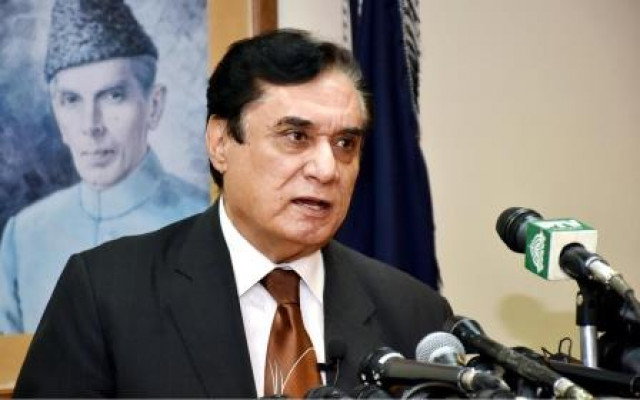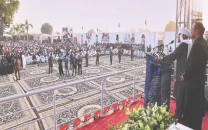NAB forms panel to allay businessmen's reservations
Six-member committee will have advisory role

National Accountability Bureau Chairman Javed Iqbal PHOTO: APP/FILE
But the constitution of the committee may not fully address the concerns of the business community due to its advisory nature, and also because it was against the spirit of the decision taken during a meeting chaired by Chief of Army Staff General Qamar Bajwa a few weeks ago.
"A committee has been formed after consultation with the NAB's executive board using the powers granted to it under Section 33(C) of the National Accountability Ordinance (NAO), 1999," according to a hand-out issued by the bureau.
The committee will comprise: Vice President of SAARC Chamber of Commerce and Industry (SCCI), Iftikhar Ali Malik; Federation of Pakistan Chambers of Commerce and Industry (FPCC&I) President Daroo Khan Achackzai; Atif Bajwa, former president, Bank Alfalah; former Lahore Chamber of Commerce and Industry president Mian Anjum Nisar; Millat Tractors Managing Director Sikandar Mustafa Khan; and former chief of Citizens Police Liaison Committee Karachi Jameel Yusuf.
Section 33C deals with measures for the prevention of corruption and corrupt practices only. It does not empower the committee to review corruption cases of the business community.
Section 33C states that "Chairman, NAB, shall from time to time as he deems fit, constitute committees comprising officers of NAB or other persons or organisations from the private or public sectors to educate and advise public authorities…develop, arrange, supervise, participate in or conduct educational programmes or media campaigns... examine the laws in force, and also rules and regulations relating to the practice and procedure of various ministries, departments of the Federal Government or Provincial Government, statutory or other public corporations or bodies, and the conduct of holders of public office and to recommend amendments in such laws, rules or regulations, as the case may be, in order to eliminate corruption and corrupt practices;
Section 33c further states that the committee may be formed to instruct, advise and assist any statutory or other public corporation or bodies or upon request, any organization in the private and public sector on measures for the reduction and elimination of corruption and corrupt practices; and(e) monitor the implementation of the instructions and advice as aforesaid and to assess and evaluate the success or otherwise of such instructions and advice on the reduction and elimination of corruption and corrupt practices.
Cabinet deliberations
A few weeks ago, Pakistan's top businessmen had complained to the army chief about alleged harassment at the hands of NAB. The army chief had promised to resolve the issue. It was assured in the meeting that a committee would be formed to review the cases of the business community.
Subsequently, the Ministry of Law referred a case to the federal cabinet last week and sought its endorsement to exclude the business community from the domain of NAB.
The sources said the majority of the cabinet ministers opposed the exclusion the businessmen from the NAB purview on two grounds.
First, the cabinet members were of the view that any decision to exclude businessmen would give an impression that the PTI government had made a compromise on its promise to ensure accountability of all, said the sources.
Second, the cabinet ministers also said that after exclusion of the business community and bureaucrats, NAB's only target would be politicians, added the sources.
The cabinet had decided that any decision regarding giving relief to businessmen should be taken by NAB without the involvement of the federal government, said the sources.
The cabinet had also deferred amendment to the NAB Ordinance with the sole purpose of giving C-class services to prisoners who are behind bars in alleged corruption case of over Rs50 million.
"Any person arrested under the provisions of this ordinance for any offence involving any amount above fifty million rupees shall be entitled to C Class or equivalent only in the prison irrespective of the stage of inquiry, investigation or trial," according to the proposed draft of the ordinance that the cabinet deferred last week.
The proposed amendment appeared to target political prisoners.
The special assistant to Prime Minister on Information Dr Firdous Ashiq was not available for comments.
Committee powers
According to NAB, the businessmen committee will present its recommendations regarding any problems faced by the business community to NAB.
The recommendations will be thoroughly reviewed by a three-member committee — consisting of the NAB deputy chairman, NAB prosecutor general of accountability and DG (operations) NAB — which will then present its final recommendations to the NAB chairman.
A decision will be taken on the proposals "without any delay and in accordance with the law", the NAB press release said.
The business community committee will also be able to present its requests directly to the NAB chairman and a legal solution would be devised for every issue through mutual understanding, it added.
However, the hand-out stated that the decision taken by the NAB chairman will be final during the process and complaints regarding the references that have already been filed would not be admissible.
The status of the aforesaid committee of the business community would only be consultative and there would be no prohibition on the use of authority legally granted to NAB, according to the hand-out.
The sources said that some of the NAB's top executives were not in favour of involving the business community in legal and investigation matters.
They were also against taking any step that might be in violation of the National Accountability Ordinance of 1999.
However, due to the involvement of the military establishment, it was decided to set-up the consultative body of the business community.
When contacted, NAB's Spokesman Nawazish Ali said that "the NAB chairman has the mandate to constitute the committee. Moreover it was further discussed in the executive board meeting and on the basis of 33-C and collective wisdom, decision for the constitution of the business committee was taken in the national interest".



















COMMENTS
Comments are moderated and generally will be posted if they are on-topic and not abusive.
For more information, please see our Comments FAQ